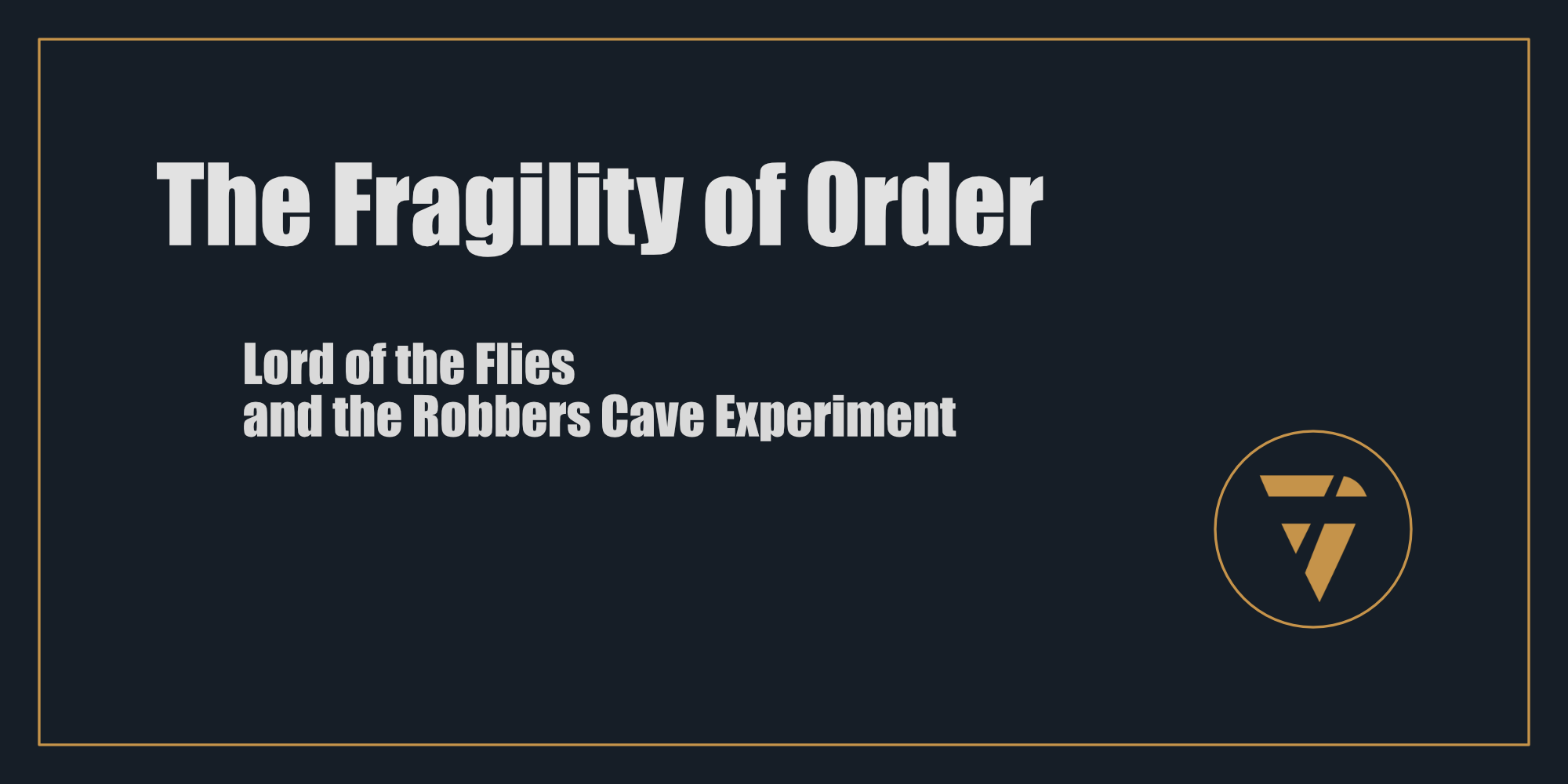The Fragility of Order
Lord of the Flies and the Robbers Cave Experiment

What if the greatest obstacle to unity isn’t our differences, but our inability to see the forces driving them?
In Lord of the Flies, William Golding crafts a chilling portrait of what happens when civilization’s structures are stripped away. A group of boys, marooned on a deserted island, quickly abandons order and descends into chaos. The story isn’t about survival, it’s about the fragility of human nature. Golding’s narrative suggests that beneath the thin veneer of rules and norms lies a primal instinct for power, conflict, and survival.
Decades later, in a controlled study, the Robbers Cave experiment confirmed some of Golding’s bleak observations—but also offered a glimpse of hope. In this landmark study, social psychologist Muzafer Sherif divided boys at a summer camp into two groups, fostering rivalry through competition. Predictably, the boys turned against each other, forming in-groups and out-groups that mirrored the tribalism of Golding’s island. But Sherif’s experiment didn’t end in chaos. By introducing superordinate goals—objectives that required co-operation to achieve—the researchers were able to unify the groups, demonstrating that collaboration could overcome division.These two works, one fictional and the other scientific, offer profound insights into human behaviour. They reveal how easily we fracture under pressure, but also how those fractures can be mended.
Thanks for the insight Robert.
Golding’s Warning: Fragility in the Face of Fear
In Lord of the Flies, fear acts as a catalyst. The boys, left without guidance, create their own order. Yet, this order quickly unravels as paranoia and tribal instincts take hold. Golding forces us to confront a painful question: are we fundamentally co-operative, or does co-operation exist only because of the structures that constrain us?
In today’s workplaces, communities, and even global politics, we see echoes of Golding’s island. When systems falter—when leadership fails or uncertainty grows—tribalism emerges. Teams divide into silos. Nations retreat into nationalism. Distrust replaces collaboration. Golding’s lesson is stark: without intentional systems and strong, ethical leadership, chaos is our default.
Sherif’s Hope: Unity Through Shared Goals
The Robbers Cave experiment takes Golding’s premise and flips it. Sherif doesn’t just observe how division forms—he manipulates it, then resolves it. When the boys at Robbers Cave competed, conflict arose. But when faced with challenges that no group could solve alone, their hostility evaporated. The act of working together transformed rivals into allies.
This principle is one we often forget: division isn’t permanent. It’s circumstantial. By creating environments where people must collaborate, leaders can dismantle barriers and rebuild trust.
The Modern Implications
What do these lessons mean for us today? Whether you’re leading a company, teaching a class, or navigating political discourse, the parallels are clear:
- Structures Shape Outcomes: Without intentional systems, human behaviour trends toward division. Leadership isn’t just about managing outcomes; it’s about designing environments where collaboration thrives.
- Fear Breeds Chaos: In times of uncertainty, fear drives people to protect their own, even at the expense of others. Transparent communication and a shared vision can mitigate these instincts.
- Shared Goals Unite: The quickest path to unity is shared purpose. Whether in business or society, finding common ground transforms adversaries into partners.
Where in your life or work have you seen the Lord of the Flies dynamic play out? How could a Robbers Cave approach—introducing shared goals—shift the trajectory.
Division may be our instinct, but unity is our opportunity. The choice lies in the environments we create, and the leadership we embody.
How are you fostering co-operation in your teams, communities, or relationships? Share your thoughts and subscribe for more insights on building resilient, unified systems.
This Substack is reader-supported. To receive new posts and support my work, consider becoming a free or paid subscriber.
This is what I’m working on. Tell me what you think, I enjoy the conversation! Subscribe and follow the work in real time.
Thanks!
B
Fear fractures, but shared purpose mends. Lord of the Flies warns us how quickly chaos forms. The Robbers Cave experiment proves unity is just one common goal away.
PS -





